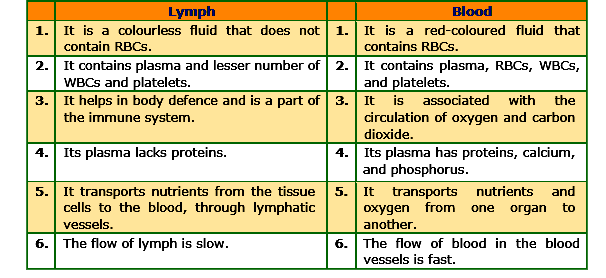
The circulatory system is a marvel of biological engineering, responsible for transporting essential substances throughout the body. It consists of two main components: blood and lymph. While blood is the more well-known of the two, lymph plays an equally vital role in maintaining health. In this comprehensive article, we will explore the differences between lymph and blood, focusing on their composition and functions.
Composition of Lymph vs. Blood
Composition of Blood
Blood is a complex fluid that consists of several components, each with a unique function:
- Plasma: Plasma is the liquid component of blood, making up about 55% of its total volume. It is primarily composed of water, electrolytes, proteins, hormones, and waste products.
- Red Blood Cells (RBCs): Red blood cells, or erythrocytes, are the most abundant blood cells. Their primary function is to transport oxygen from the lungs to cells and tissues throughout the body and carry carbon dioxide, a waste product, back to the lungs for exhalation. They contain the protein hemoglobin, which binds to oxygen.
- White Blood Cells (WBCs): White blood cells, or leukocytes, are a diverse group of cells that play a crucial role in the immune system. They defend the body against infections and foreign invaders. There are several types of white blood cells, each with specific functions, including neutrophils, lymphocytes, monocytes, eosinophils, and basophils.
- Platelets: Platelets, or thrombocytes, are small cell fragments that play a pivotal role in blood clotting (coagulation). They help stop bleeding by forming blood clots at the site of injury.
Composition of Lymph
Lymph is a clear, watery fluid that resembles plasma but has a different composition:
- Lymphatic Fluid: Lymphatic fluid is the main component of lymph, consisting of water, electrolytes, and waste products.
- White Blood Cells: Lymph contains a significant number of white blood cells, particularly lymphocytes. These are essential for the immune response and help the body recognize and fight infections.
- Proteins: Lymph also contains proteins, including antibodies (immunoglobulins), which play a critical role in immune defense.
Functions of Lymph vs. Blood
Functions of Blood
Blood serves several vital functions in the body:
- Transport: Blood carries oxygen, nutrients, hormones, and waste products to and from cells and tissues throughout the body.
- Regulation: Blood helps regulate body temperature, pH levels, and fluid balance.
- Immune Response: White blood cells in the blood help protect the body against infections and diseases.
- Blood Clotting: Platelets prevent excessive bleeding by forming blood clots at the site of injuries.
Functions of Lymph
Lymph, on the other hand, primarily plays a role in the immune system and maintaining fluid balance:
- Immune System Support: Lymph carries white blood cells, especially lymphocytes, which are crucial for recognizing and fighting infections. Lymph nodes, small structures along the lymphatic vessels, filter and trap harmful substances and pathogens, allowing white blood cells to eliminate them.
- Fluid Balance: Lymphatic vessels collect excess tissue fluid (interstitial fluid) and return it to the bloodstream. This helps maintain fluid balance and prevents tissue swelling (edema).
- Fat Absorption: Lymphatic vessels in the small intestine are involved in absorbing dietary fats and fat-soluble vitamins, transporting them to the bloodstream.
Interaction between Blood and Lymph
Blood and lymph are interconnected systems that work together to maintain homeostasis and protect the body. Blood delivers oxygen, nutrients, and immune cells to tissues, while lymph helps remove excess fluid and waste products. Additionally, lymphocytes produced in the bone marrow circulate through both blood and lymphatic systems, allowing them to patrol the body and respond to threats effectively.
Conclusion
In summary, while blood and lymph share some common components, such as white blood cells, they have distinct compositions and functions. Blood primarily serves as the transport system for oxygen, nutrients, and immune cells, as well as playing a crucial role in blood clotting. In contrast, lymph supports the immune system, helps maintain fluid balance, and aids in the absorption of dietary fats. Together, blood and lymph form a dynamic duo that keeps the body healthy and functioning optimally, protecting it from infections and maintaining essential physiological processes.



